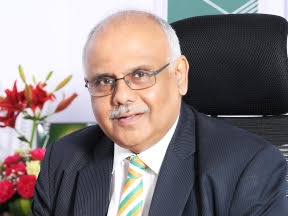To expand its operation in Indian market, ESR – the Hong Kong-based logistics developer has announced that the company has acquired a 39-acre land in Chennai for Rs 332 crore to tap into the growing demand for warehouses and logistics facilities. Located on SH-48, close to Oragadam junction, the park would be connected by air, road, rail and ports. Abhijit Malkani and Jai Mirpuri, Country Heads of ESR India states, “Due to its strategic location and connectivity to the world through ports, business environment, infrastructure and strong workforce, ESR Oragadam will be well-positioned to cater to the needs of the expanding industries across automobile, auto-ancillary, R&D centres, 3PL’s, E-commerce, electronics, energy, aerospace and defence. This investment is in synergy with ESR’s goal to build a significant portfolio of modern industrial and logistics infrastructure across the country.”
Read More »West Bengal to get logistics policy: Amit Mitra
With an aim to integrate the fragmented logistics sector of the state and also drive in efficiency, West Bengal is ready with a logistics policy and will soon seek feedback from the industry, informs, Amit Mitra, Finance Minister, West Bengal. Speaking at a webinar organised by the Confederation of Indian Industry (CII), he said, “The logistics sector is very important since it creates huge employment opportunities. The policy will broadly deal with areas like creating last-mile connectivity, fostering technology adoption and building logistics skill sets.” West Bengal is uniquely poised in its positioning as it has the advantage of multimodal logistics capabilities such as water, roads and railways. The size of the state’s logistics market is US$ 20 billion, which makes it an attractive proposition for businesses, said Mitra. He said the government is promoting logistics hubs in Siliguri, Malda, Tajpur and Durgapur. “Some of the focus sectors are tea, chemicals and petrochemicals, food processing, renewable energy and jute products. The state is also part of international corridors like BBIN, BCIM and BIMSTEC,” he said.
Read More »From the pages of CargoTalk: Regionalisation of supply chain opens opportunity in manufacturing & logistics: N Sivasailam
According to N Sivasailam, Former Special Secretary (Logistics), Ministry of Commerce & Industry, regionalisation means India’s self-reliance along with the globe. He adds, “This initiative would create facilitative environment in order to ensure a good reign of business. It may cover not only the movement of petroleum and other essential goods but also a whole lot of India’s exports in container trade. We are not trying to say that vessels should be of Indian investment or there should not be any foreign investment. However, this is also a means of attracting foreign domestic investment in India and making India an attractive place for FDI for the service sector.”
Read More »Ethiopian Cargo partners with RTS on cargo revenue management & pricing solutions
Ethiopian Cargo & Logistics Services has partnered with RTS on cargo revenue management (velocity) and pricing (AcceleRate) solutions. Fitsum Abady, MD, Ethiopian Cargo & Logistics Services states, “We are very optimistic that having Revenue Management and Pricing system will help us to maximise revenue by utilising the available capacity for high yield cargos. This revenue maximization would be achieved using an automated decision-making system that would be accurately forecasting cargo capacity by flight and a price range for evaluating pricing requests. It also helps allocate capacity to the appropriate products in such a way that maximizes profit. “ According to Mukundh Parthasarathy, Senior Vice President for Revenue Technology Services, “At the rate at which Ethiopian Cargo is growing, the solution would be instrumental in automating the revenue and pricing management.”
Read More »Spoton Logistics returns to 90% normalcy; delivering goods amid the pandemic
Seamlessly transitioning to the new normal, Spoton Logistics has ended the month of June and July with a recovery of greater than 90 per cent of pre-lockdown figures. The service provider has been delivering essential goods since the first lockdown imposed by the Government of India in March with pharma & healthcare emerging as the top sectors. Despite the challenges resulting from the exodus of migrant workers, driver issues, and several administrative hurdles, the company effectively ensured business continuity for all its clients. As an essential service provider, Spoton Logistics facilitated the delivery of medicines, sanitizers, masks, etc. pan India during the lockdown period. “While on one hand, the lockdowns induced by the pandemic brought a slew of operational industry-wide challenges, on the other, it has accelerated the adoption of digital initiatives across our customer base. Businesses have now become more receptive to technology and digitisation and it is overwhelming to witness this transformation as we transition to the new normal,” said Abhik Mitra, MD & CEO, Spoton Logistics.
Read More »ICRA revises the outlook of logistics sector from stable to negative
Given the prevailing circumstances and its near impact on the industry metrics, ICRA (formaly known as Investment Information and Credit Rating Agency of India) has revised the outlook on the logistics sector from ‘stable’ to ‘negative’. With intermittent lockdowns still in place in several pockets across nation and muted recovery anticipated in the industrial activity, the logistic sector including warehousing sector is likely to witness sharp demand contraction in the near-term. Consequently, in FY2021, ICRA expects a contraction of 18-20 per cent Y-o-Y in aggregate revenues of its sample of logistics companies. Additionally, the near-term profitability metrics are anticipated to remain under pressure given the subdued fleet utilisation levels in light of muted freight availability, and continued high fixed costs such as driver salaries, truck EMIs and maintenance costs. Accordingly, the outlook on the sector has been revised to ‘negative’ from ‘stable’. The rapid rise of Covid-19 pandemic and subsequent restrictive measures implemented by the central and state governments to contain the disease has adversely impacted the prospects of the Indian logistics sector, especially the road freight transportation movement. The implementation of the 40-day nationwide lockdown aggravated the prevailing softness in the Indian economic activity, resulting in a decline in freight availability during Q4 FY2020, which further contracted sharply in Q1 FY2020.
Read More »Shipping Minister urges private players to join hands with government in PPP project for ports
Expressing concern over the high logistics cost in the country, which was 30 per cent more than those in developed nations, Mansukh Mandaviya, Shipping Minister, informs, “The government has initiated multiple steps, including strengthening inland waterways, to reduce high logistics cost. He urged private players to join hands to propel India’s growth. “The government of India has taken a large number of steps to reduce logistics cost in the country in order to fuel growth. These include making a network of inland waterways to transport cargo in a cost-effective manner. We have made 1,400 km of waterways operational. The aim of creating a network of waterways is to reduce logistics costs, boost exports and make the country self-reliant, as per Prime Minister ‘Atmanirbhar Bharat’ initiative,” Mandaviya said. “It is time that private players join hands with government in PPP (public private partnership) projects including ports to fuel economic growth,” the minister said. He urged private sector companies to come forward for initiatives like indigenous building of cranes for ports which so far were being imported at an annual cost of about Rs 10,000 crore. The shipping ministry has taken initiatives like introducing the ‘PCSIx’ platform to reduce logistics costs. Port community system ‘PCS1x’ is a cloud-based technology that offers services like notification, work-flow and track and trace and it is estimated that this feature alone will reduce up to two days in the life of a transaction. “Inter-ministerial consultations were on to boost multimodal transport in the country. Enhanced focus on waterways has resulted in higher cargo movement on inland waterways as well as the Indo-Bangladesh protocol route which has enabled faster delivery of cargo to north eastern states, including …
Read More »From the pages of CargoTalk: Logistics is little more than infrastructure: Suresh Prabhu
Calling logistics the biggest hurdle in the Indian business among other barriers, Suresh Prabhu, Former Minister of Commerce & Industry and Civil Aviation, Government of India, says, “We must distinguish between logistics and infrastructure. Infrastructure is a basic necessity for logistics but just by creating infrastructure one cannot address the problem of logistics. Despite investing enough into infrastructure in the last decade or two, the logistics problem has not been solved. We need to focus on integration in the logistics industry. We have invested huge amount of money in last few years into development of roads, but can one confidently say that it has necessarily resulted into better logistics? Therefore while we need roads, railways, ports and air connectivity, we also need to ensure all the modes need to work in tandem and they produce the desired results. Logistics is little more than infrastructure.”
Read More »GEFCO to handle distribution of Ford vehicles in France
GEFCO France has recently announced that the company will be handling the distribution of new vehicles of the Ford brand to its network of dealers throughout France. While the company was already providing storage and transport services for a few thousand new Ford vehicles to its national dealer network, this new partnership demonstrates the manufacturer’s confidence in GEFCO’s expertise in automotive logistics. The company was selected by the car manufacturer, following a consultation, for the distribution of 40,000 vehicles per year in total. According to the new distribution plan defined by the manufacturer for France, which is part of a system of direct deliveries, GEFCO France has been carrying out car dealerships, handling and transporting Ford vehicles, since the reopening to customers in May.
Read More »Retailers to evaluate fulfillment strategies to achieve web orders
86 per cent of APAC retailers looking to increase investment in intelligent automation by 2022, says, 12th Annual APAC Shoppers Study by Zebra Technologies. With the businesses reopening and rebuilding from the COVID-19 pandemic, the resiliency of retailers and supply chains are being tested more now than ever before. One monumental shift relates to the concept of ‘economy at home’, which addresses the way consumers have completely changed their shopping habits. To meet rising customer expectations, retailers need to rethink the safety of the customer journey, whether it is in store or via delivery. Click-and-collect, or buy online, pick-up in store (BOPIS), are becoming preferred methods of shopping, with 55% of consumers requesting more retailers to offer mobile ordering options. This is forcing businesses to rethink their fulfillment strategies given that only 36 per cent of respondents agreed that their stores are equipped to fulfil web orders. The study expects this trend to continue, while retailers implement additional solutions that minimize in-store contact and improve customer convenience at the same time. “COVID-19 has significantly altered the retail sector, forcing both essential and non-essential retailers to assess their Omni channel fulfilment capabilities and quickly adapt their operating models in a matter of days – some implementing changes within hours,” said Deep Agarwal, Regional Sales Director of India, Zebra Technologies. “We’re seeing how retailers are transforming ‘dark stores’ to serve as temporary distribution facilities inside their establishments. Retailers should prioritize the expansion of click-and-collect service offerings and invest in technologies that increase shopping capacity and speed. This reduces in-store traffic and aids in social distancing efforts, while providing retailers with inventory visibility across every corner of the shop floor.”
Read More » Cargo Breaking News
Cargo Breaking News









